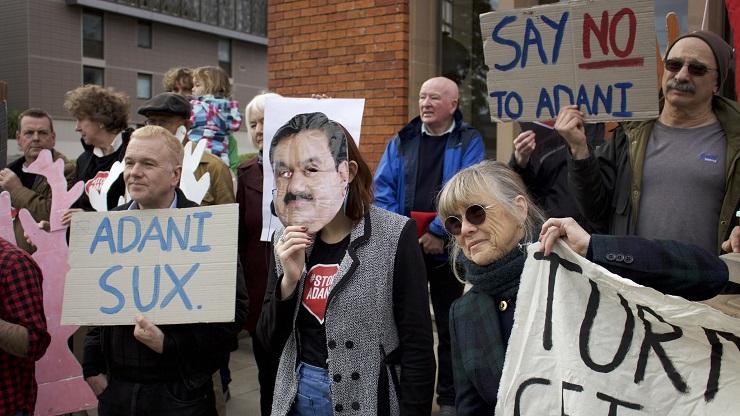ASIACALLING
Coal mines and climate change: Australia's Adani controversy

Australia is one of the world’s largest coal producers, exporting to Japan, China, South Korea, India and Taiwan.
After a fraught seven years, marked by controversy and opposition, a new coal mine has recently been approved in the country’s north east.
The Carmichael coal mine would be run by Indian mining giant, Adani. And at an estimated value of AUD$21.7 billion, it would be Australia’s largest ever coal mine.
But the coal is to be exported coal via one of the country’s most loved marine destinations: The Great Barrier Reef.
It is bound to have drastic environmental impacts. And many Australians are now asking what the real price of coal is.
From Sydney, Jake Atienza explores the fierce debate that’s unfolding.
Australia is renowned for its beaches. Every year, millions of tourists visit to get a taste of life in this self-proclaimed ‘lucky country.’
And lucky it is. In terms of natural resources, Australia is one of the richest nations in the world.
But many are arguing that the government’s poor management of natural resources is simply lining the pockets of international mining companies, and destroying the natural environment.
The Carmichael coal mine, on Australia’s north east coast has recently acquired government support, and backing from investors.
With an estimated lifespan of 60 years, the 28,000 hectare coal mine is projected to contribute up to AUD$44.3 billion to the Australian economy. It would become Australia’s largest coal mine.
But the mine has tapped into a live debate in Australia, and is facing overwhelming opposition from environment groups.
“It’s about having a safe climate. Avoiding more extreme weather in the future,” stated Imogen Zethoven, from the Australian Marine Conservation Society in Sydney.
“Looking after the ocean in general and our forests. The health of our wellbeing, future genera-tions.”
Imogen continued, “These projects that are promoting fossil fuels, actually not just jeopardise the Great Barrier Reef but they jeopardise all the jobs along the reef coastline that are dependent on it.”
As the world’s biggest living structure, and home to a diverse ecosystem of coral and marine life, the Great Barrier Reef is vulnerable to major land transformations brought about by mining.
![]()
Australia has one of the world’s most regulated mining industries, but Zethoven says the govern-ment is ignoring how coal mining contributes to climate change.
An immediate transition to renewable energy should be the government’s top priority.
Supporters of the Carmichael coal mine say the project will boost jobs in an area facing high levels of unemployment.
But Imogen says that renewable energy could provide those jobs instead.
“We know that renewable energy is a huge job creator,” she said. “If the Queensland government’s target of 50% renewable energy by 2030 is to be achieved then it will achieve between 6400 and 6700 jobs there in regional Queensland.”
Meanwhile, Indian mining company Adani is seeking a AUD$900 million loan from the Australian government to help finance the construction of a rail line to support the mine.
Opponents argue that the government should not be using tax payer’s money to help fund a mine.
“They should be funding things like renewable energy to actually stop us from getting to dangerous global warming,” saidd James Dagher , NSW Coordinator of the Australian Youth Climate Coali-tion, and leader of the #StopAdani campaign in Sydney.
“We want to invest in infrastructure that supports long term economic benefit to the country. Build-ing things like the renewable energy that we need,” he argued.
70% of Australia’s electricity comes from coal.
But Mick Crowe, Director of Resource Industry Network - a peak body representing companies in the mining sector, says that the transition to renewables shouldn’t be rushed.
“There’s no short term available solution with power, with solar and wind that those communities can pay for in the short term,” he claimed.
“If you wanna not disturb the earth at all, then we all have to change the way we live. But if we do wanna actually do it, this is the right place to do it.”
The place in question is the land of the Wangan and Jagalingou People. They’re the Indigenous people who have cared for the land for tens of thousands of years, and they have consistently op-posed the mine.
“Our people still live in poverty. Nothing has changed. There is not one mining deal that we’ve previously agreed to that has benefited our people,” said Marrawah Johnson, spokesperson for the Wangan and Jagalingou Traditional Owners Council.
Johnson alleges Adani paid more than 200 Aboriginal people to pose as Wangan and Jagalingou People in an attempt to obtain consent to purchase 2,700 hectares of Wangan and Jagalingou land.
“They do not have the right to supposedly consent to the destruction of that country,” she stated.
The first hearing to settle the land dispute between Adani and the Wangan and Jagalingou People will take place in March 2018. It is the final challenge that could stop the Carmichael coal mine from going ahead.
- Australia coal mining
- Stop Adani
- Adani
- Climate change
- environment Australia
- The Great Barrier Reef
- Jake Atienza
Komentar (0)
KBR percaya pembaca situs ini adalah orang-orang yang cerdas dan terpelajar. Karena itu mari kita gunakan kata-kata yang santun di dalam kolom komentar ini. Kalimat yang sopan, menjauhi prasangka SARA (suku, agama, ras dan antargolongan), pasti akan lebih didengar. Yuk, kita praktikkan!